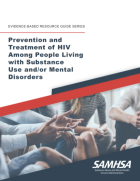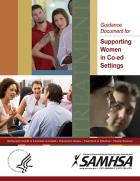This model standards guidance document, SAMHSA's National Model Standards for Peer Support Certification, is prepared in response to President Biden's 2022 Unity Agenda. This document outlines model standards for substance use disorder, mental health, and family/youth peer support certification.
Dashboard: Filter Bricks
Main page content


This guide reviews interventions on treating substance misuse and substance use disorders (SUD) in youth with serious emotional disturbances (SED), distills the research into recommendations for practice, and provides examples of the ways that these recommendations can be implemented.

This guide reviews interventions for people living with substance use and mental disorders who are at risk for or living with HIV. Selected interventions are in alignment with goals of the federal “Ending the HIV Epidemic: A Plan for America” (EHE) initiative.

This guide offers best practices for treating women living with substance use disorders in co-ed treatment and recovery settings. It highlights the importance of gender differences, cultural sensitivity, and developing healthy relationships.

This manual offers guidelines for working with suicidal adults living with substance use disorders. It covers risk factors and warning signs for suicide, core competencies, and clinical vignettes. Access the literature review.

This manual introduces a concept of trauma and offers a framework for becoming a trauma-informed organization, system, or service sector. The manual provides a definition of trauma and a trauma-informed approach, and offers 6 key principles and 10 implementation domains.

This manual explains peer recovery support services designed and delivered by people in recovery from substance use disorders. It discusses types of peer support for recovery, the adaptability and value of peer recovery support services, and cross-cutting core principles.

